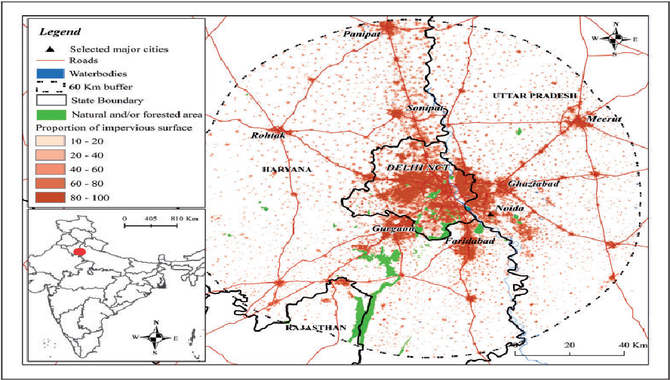The world’s population is expected to reach 9 billion by 2050. If current trends continue, approximately 80% of the world’s population will be urban by 2050.
This means that a large percentage of the world’s population will live in urban areas, with many people having to commute from rural areas for work and education. Urbanization has had a huge impact on our environment.
It has led to pollution, habitat loss, climate change, and city biodiversity decline. The health risks associated with environmental degradation are widespread and significant. Living a green lifestyle is important for our health, the environment, and future generations. While it’s ideal to live in a place with a sustainable environment, this may only be possible for some.
If you’re interested in taking environmental action and looking after the planet, you’d want to settle in the right city. Here’s an analysis of the environmental impact of cities around the world. Here, we’ll tell you whether living in a rural area reduces environmental impact. But before getting into that, let’s understand how environmental awareness is affected by country and city life.

What Is Environmental Awareness?
Environmental awareness is the understanding and concern for environmental problems and issues. It varies from country to country and from city to city. Cities are often more aware of environmental issues than rural areas.
The level of environmental awareness also varies, depending on factors such as age, education, income, ethnic and cultural background, language proficiency, and government policies. While some may be worried about climate change or pollution, others may not care at all. In any case, the influence of culture and social norms on environmental awareness is complex.
A person’s beliefs and experiences can impact their views on environmental issues. Some studies have shown that having good environmental literacy improves a person’s ability to understand sustainability issues and make informed decisions. This knowledge can help build an environmentally conscious society, leading to better health outcomes, sustainable practices, and increased economic productivity in urban areas.
The Influence Of Country Vs. City On Environmental Awareness

Several factors can influence the environmental awareness of the population. One of the key factors is the urban-rural dichotomy. This dichotomy suggests that people living in urban areas are more aware of environmental issues than those who live in rural areas. This may be true to a certain extent. However, environmental awareness can only be generalized across some individuals.
Economic development and industrialization also have a significant role in shaping people’s environmental awareness. When the economy becomes prosperous, and industrialization occurs rapidly, there should also be an increase in environmental awareness among the population.
The mass media is another major factor in influencing environmental awareness. The media plays a crucial role in raising people’s awareness about environment-related issues such as climate change or pollution of the environment.
Furthermore, ecotourism and sustainable tourism have potential roles in promoting environmental awareness. It helps tourists to discover the natural world and provides local communities with additional income. But with increased awareness around environmental sustainability among people of all age groups and socioeconomic classes, it is evident that people are making conscious choices to live more sustainably.
While urbanization has led to a decline in environmental awareness, country life is still considered an ideal choice for those who wish to minimize their environmental impact. Let’s explore how much influence country vs. city has on environmental awareness and why you must decide to live in either based on your preference and circumstances.
Greater Impact On Environmental Awareness
City dwellers are more likely to be influenced by the environment around them. Country residents tend to care more about their local community and the natural world. This is because city life is full of urban pollution, and air, and water pollution. Other environmental problems can influence people’s thinking and actions.
In contrast, country living has a greater impact on environmental awareness as it encourages people to take care of the environment surrounding them. By being more aware of their local environment, city dwellers can make informed decisions about how they can protect and improve it.
City Influences On Environmental Awareness

Cities have a larger impact on the environment than rural areas. After all, urban areas are home to more people and are more energy-hungry than rural areas. Cities also tend to be more affluent and have higher pollution levels than rural areas, making them more polluting overall.
All of this makes city residents more likely to be aware of their action’s impact on the environment. This is why they are often more active in environmental organizations and support environmental initiatives. On the other hand, city life can influence environmental awareness positively or negatively, depending on how sustainable our actions are.
City Vs Country: Where Is It Better To Live Sustainably Now?

If you live in a city, you are much more likely to be aware of environmental issues and sustainability. This is because you are connected to your environment through the natural resources and technology available in the urban environment.
On the other hand, country dwellers often live sustainably because they have less access to resources and technology. This makes them more reliant on natural resources and sustainable practices. The influence of culture plays a big role in how people live sustainable lives, in the city or rural areas.
City residents are influenced by the growing environmental awareness and sustainable lifestyle among urbanites. It leads to greater environmental awareness among country dwellers. But even when people live in different environments, they always strive to make the world a better place. Well, Also for themselves and their future generations.
The Dynamics Of Urbanization

Urbanization is the process of urban growth and development. As cities grow, they demand more resources, including water and energy. This increase in demand has led to an increase in environmental pollution in cities. Cities are also responsible for most global greenhouse gas emissions.
And this is because of their heavy reliance on fossil fuels such as coal and oil. The effects of urbanization on the environment are complex and ongoing. Still, there are ways to make city living more sustainable.
For example, by adopting sustainable technologies, reducing waste, and taking steps to reduce our carbon footprint. Overall, there is a need to address the impact of urbanization on the environment through sustainable urban planning and development.
Health Effects Of Environmental Degradation

Compared to city-dwellers, country dwellers tend to have a smaller environmental impact. And it’s due to the lower population density and reduced reliance on cars and other forms of transportation. Cities rely heavily on cars and other forms of transportation, which can lead to higher pollution levels.
Plus, city living creates more opportunities for environmental degradation. All this adds up to make city-dwellers a greater environmental threat than country-dwellers. Despite these challenges, both city and country dwellers can take action to reduce their environmental footprint.
By shifting to sustainable transportation methods, reducing waste, and choosing sustainable products, urbanites and rural residents can help protect our natural resources and improve the health of our ecosystem.
Urban Environmental Policy Challenges
Urban areas have a greater impact on the environment than rural areas. Cities produce the largest share of global greenhouse gas emissions and are responsible for over half of all urban air pollution. They also face challenges in sustainability due to higher population and consumption rates, longer life expectancy, and high consumption levels.
Cities must implement environmental policies to address these issues, such as sustainable energy use and urban planning. Such policies can help reduce pollution and promote sustainability in urban areas. However, it is important to remember that sustainable development requires balanced approaches to environmental protection and development.
Why Rural Areas Are Becoming Less Attractive

In today’s world, many urban centers have replaced vast rural areas. Plus, the economic downturns in rural areas have also led to a decline in the number of people living in rural areas. The rise of technology has led to a decline in face-to-face communication and social interaction between people in urban and rural areas.
Urbanization has increased pollution levels and decreased the quality of life in rural areas. The governments are taking measures to promote sustainable development by promoting rural development initiatives.
This will help local communities develop sustainable economic and environmental policies for their local areas. They will be able to create well-paid jobs for residents and improve their quality of life by protecting natural resources, increasing access to clean water, and providing sustainable energy sources. The governments must reverse the trend of urbanization in rural areas, as it presents several benefits to local communities.
Reasons To Live In The Countryside

There are several reasons to live in the countryside, including reduced environmental impact. Rural areas are home to a greater diversity of plants and animals, which helps support a healthy ecosystem. In addition, rural areas may be more affordable than city centers, making them an ideal choice for people on a budget. Regardless of your lifestyle, there are numerous benefits to living in the countryside, no matter where you live or what interests you.
The Importance Of Living A Green Lifestyle
Rural areas used to be more environmentally conscious because people had to care for their land. However, with the city’s rise and urbanization, rural areas are losing their appeal. As cities have flourished and urbanized, rural areas, have seen a decrease in population and a loss of economic activity.
This has led to environmental degradation and a decreased quality of life. To reverse this trend, people living in rural areas must be more conscientious about their environmental footprint. They must make sustainable choices such as reducing energy consumption, avoiding waste, and recycling.
The Impact Of Living In A City On The Environment

Cities have a greater environmental impact than rural areas because they generate more waste. Cities produce more pollution from manufacturing, transportation, and energy consumption. Urban areas also release more carbon dioxide per person than rural areas due to the higher population density of cities.
The cost of housing is often higher in cities than in rural areas; even if you’re earning the same salary as someone living in a city, this still isn’t enough money to afford housing in a big city without financial assistance from the government or other sources. Besides, you don’t get economic benefits by living in a big city like you would in rural areas.
Rural areas are losing their appeal to people because of living in an urban environment with high environmental impact. This means that people want to live where they will have a minimal impact on the natural world. As a result, urban areas continue to grow, and rural areas shrink, resulting in a decrease in environmental sustainability.
The Pros And Cons Of Living In A City
The pros and cons of living in a city are endless. Cities offer more opportunities for environmental awareness and activism. Cities are more likely to have well-developed public transportation systems. This means that it’s easy and convenient to get around the city, no matter how large or small the area is.
Cities often have a larger population of people from different cultures and backgrounds, which creates a more diverse environment and lifestyle. Cities often have a greater variety of dining options and a greater variety of food choices, which makes living in the city an exciting experience. Having access to all these things encourages people to be environmentally conscious. But there are downsides as well, such.
- City pollution levels can be higher than those in rural areas due to the larger population density and urban centers’ reliance on fossil fuels for energy production.
- Living in a city involves higher environmental risks, such as air pollution and environmental degradation caused by urbanization development.
- It can also mean more reliance on energy consumption and consumption of resources such as water, land, and oxygen.
- There are also health risks involved with living in large urban areas, ranging from exposure to pollution to issues related to public health like obesity or cancer. Besides all this, you cannot experience the natural world like you could if you lived on a farm or rural area where nature is allowed to flourish unencumbered.
Reduced Environmental Impact

City living has many benefits, including reduced environmental impact. City dwellers are more likely to be aware of the environment and take action to reduce their environmental impact. This can range from reducing their consumption of resources, such as water, to taking short- or long-term steps to reduce greenhouse gas emissions.
City life also provides opportunities for social engagement and activism, which can help foster a sustainable society. However, city life has its challenges. City dwellers may experience increased noise levels and decreased privacy compared to rural areas. All in all, city living can improve the sustainability of communities and the planet as a whole.
Reduced Need For Transportation And Parking

Cities offer a range of environmental benefits that can make them a better choice for environmental sustainability than rural areas. Living in a city means a reduced need for transportation and parking, which can save you money on costs associated with car ownership.
Additionally, city dwellers have access to a wider range of environmental resources and opportunities, making it easier to engage in environmental activities. Cities also offer a more stimulating and enjoyable lifestyle, which can lead to increased levels of environmental awareness among residents.
Whether you live in a city or the countryside, it is important to take care of the environment and reduce your impact on the planet. By living in an urban area and taking advantage of the environmental benefits offered by cities, you can help protect the natural world and demonstrate your commitment to environmental sustainability.
Increased Opportunity For Work And Career Growth

Many people prefer living in cities because they offer increased opportunities for work and career growth. Cities have a larger population of people from diverse backgrounds, which can lead to new ideas and innovations. City life can be hectic and stressful, but it also offers a variety of entertainment options.
However, some people complain about the noise and pollution in cities. These drawbacks are generally outweighed by the benefits of city life, such as access to large job markets and cultural activities. Overall, living in a city has its benefits and drawbacks, but it is always up to the individual to decide what is best for their lifestyle.
Increased Opportunities For Socializing And Networking
Cities provide greater opportunities for socializing and networking than rural areas. People living in cities tend to spend more time outside their homes and interact with a greater variety of people than those living in rural areas. Due to their urban location, city dwellers often have access to a larger range of cultural activities and educational opportunities than those living in rural areas.
Additionally, city life encourages people to be more environmentally conscious, as they face greater challenges related to pollution and waste management. Overall, city life offers a diverse range of social, environmental, and economic benefits that can make it worth considering for those who are looking for a lifestyle change.
Increased Access To Cultural And Recreational Opportunities

City residents enjoy increased access to cultural and recreational opportunities, which can increase their environmental awareness. City dwellers often have more opportunities to meet new people and learn about different cultures, which can lead to increased environmental awareness. Additionally, city living can lead to increased exposure to pollution and noise.
This can strain the health of city residents and may result in higher levels of pollution in the city’s air and water. These factors make it important for city residents to live sustainable lifestyles that protect the environment and promote sustainability. Being able to reduce your carbon footprint, for example, can help you lower your environmental impact and save money in the long run.
Conclusion
The influence of environmental awareness in rural areas must be considered. Having access to sustainable resources and practices that promote environmental sustainability is an important factor in the development of a region.
Shifting to sustainable lifestyles that are centered around local resources, making informed choices about material goods, and reducing our impact on the environment help people in rural areas make sure their traditions and way of life do not harm the environment.
This can reduce pressure on natural resources, stabilize populations and improve the health of local communities. The influence of environmental awareness on sustainable development has been well documented.
Frequently Asked Questions

I’m a writer and blogger who loves to talk about entertainment, culture, and relationships. I love to share my thoughts and insights on these topics, and I’m always looking for new ways to engage with my readers. I’m also a big fan of learning new things, so I’m always exploring new areas of interest.
